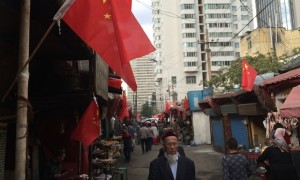Chinese newspaper editor sacked for criticising Beijing’s ‘war on terror’
The Guardian, 2 November 2015
By Tom Phillips – A Chinese newspaper editor has been sacked for criticising Beijing’s controversial war on terror following the introduction of draconian new rules that outlaw any criticism of Communist party policy.
Zhao Xinwei, the editor of the state-run Xinjiang Daily newspaper, was removed from his job and expelled from the party after an investigation found him guilty of “improperly” discussing, and publicly opposing, government policy in China’s violence-stricken west.
The former editor’s “words and deeds” had gone against government attempts to rein in religious extremism and terrorism, the official China News Service agency reported on Monday.
In Xinjiang, a sprawling region of west China where Beijing is grappling with what some describe as a low-level insurgency against Communist party rule, the crackdown on dissent has been particularly intense.
Zhao, who joined the party in 1984 and became the newspaper’s editor in 2011, had also been caught accepting bribes, wasting public money and “turning a deaf ear to wrongdoing” in his organisation, the report added.
Zhao’s removal from the job and the Communist party comes just over a week after Beijing unveiled harsh new rules banning party members from “making groundless comments on national policies”.
Those who “irresponsibly make comments about national policies” or who “defame the nation, the Party and State leaders or distort the history of the nation and the Party” will be punished, the state-controlled Global Times tabloid newspaper reported.
“Party members who take the liberty to decide or publicly comment on issues that they have no place to, such as issues that should be decided by the CPC [Communist Party of China] Central Committee, will also be subject to punishment,” it added.
Beijing has shown an increasing intolerance for dissent since Xi Jinping – a man some call China’s most powerful leader since Mao – became Communist party chief in November 2012.
In the three years since Xi took power, activists, lawyers, academics, bloggers, journalists, religious leaders and party members have all been targeted as part of a sweeping assault on party opponents.
In May last year Beijing launched a “people’s war on terror” in Xinjiang following a series of deadly attacks on civilians.
In September, Ilham Tohti, a respected academic who dared to speak out against Beijing’s treatment of Xinjiang’s Uighur ethnic minority, was jailed for life for“inciting separatism”.
In a recent interview, Nicholas Bequelin, Amnesty International’s director for East Asia, said the Communist party had sought to completely shut down any critical discussion of its policies in Xinjiang.
Particularly taboo was criticism of Beijing’s repressive security tactics or debate about how the Uighurs’ social and economic exclusion was helping fuel repeated outbreaks of ethnic violence between Uighurs and Han Chinese migrants.
“People who ask the question: ‘Who benefits [from Xinjiang’s economic boom]?’ generally suffer the fate of Ilham Tohti and end up in prison,” Bequelin said.
Additional reporting by Luna Lin


